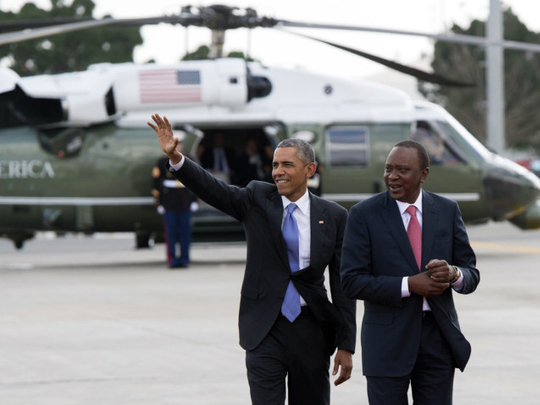
“Barack Obama’s sojourn in Kenya, the land of his father, was akin to the climax of a classical odyssey or epic saga,” said the Guardian in an editorial. “After un-numbered African generations suffer the agonies of enforced servitude and historical exile, a favoured son, blood of their blood, returns in triumph to claim the mantle of leader and heroic figure. Doubtless, White House spin doctors would love to have the story told this way. Yet notwithstanding the tired cynicism of the political age and the familiarity of Obama’s much-told personal journey, this remarkable reversal of fortunes, briefly glimpsed and savoured this weekend, remains genuinely uplifting,” it said.
At the same time, the newspaper said, “symbolism does not feed starving children”. Observing that Obama’s agenda in Nairobi, and subsequently in Addis Ababa illustrated both the reach and the limits of American power, it said: “Too often, the international community looks to the US to solve all its problems. It should have learned by now how fallible Washington’s supposed solutions can be. But could Obama, as the leader of the world’s wealthiest and most powerful nation, have done more, more quickly and more effectively, to help address these issues in recent years? Some African commentators answer with a resounding “Yes”.”
On the road ahead in US-Africa relations, the paper said: “Obama could and should do better. And now is the optimum moment for him to try. He has 18 months left to go in a presidency that has hit a Republican roadblock in Congress in terms of domestic legislation.”
The New York Times, exploring what it called the “layers of meaning” behind Obama’s trip to Africa, said: “Roots are an integral part of one’s identity, especially in a time of mass migrations. So it is no surprise that Barack Obama’s first visit to Kenya as president should be enormously poignant, complex and absorbing. This is no typical presidential visit — and this is no typical descendant of immigrants.”
Noting that the mix of narratives behind Obama’s trip was extraordinary, the newspaper said in an editorial: “It is the ultimate American dream: the step-grandson of an illiterate African rising to the most powerful office on earth. There is Mr. Obama’s own story so movingly told in his first book, “Dreams From My Father,” about a youth raised by a white mother in Hawaii trying to build an identity out of his complex background, and the central role played in this search by the Kenyan father he meets only once.”
The editorial then further examined the president’s African roots, commenting: “The Kenyan step-grandmother Mr Obama calls Mama Sarah, and the other relatives he met on his previous trips, are as much part of his identity – and of his presidency – as his upbringing in Hawaii and Indonesia, his work in Chicago, or his studies of law. It is impossible to imagine that Mr. Obama’s vision of America’s role in the world, or his efforts to improve the lives of Americans, are not shaped at least in part by his familiarity with the complexity of the world and of his own identity.” While not expecting the trip to produce “all the benefits that [Obama] hoped to deliver,” the paper observed that nevertheless, “when the world’s most powerful leader touches the most humble of roots, the symbolism of the moment transcends the normal metrics of politics”.
The Nairobi-based Daily Nation newspaper, meanwhile, hailed the visit as a “poignant and historic moment” and said: “This visit is important not just because President Obama is the first sitting US leader to visit Kenya, but because his will be a homecoming of sorts to the land of his father. That explains the enthusiasm generated over the first visit to Kenya since his 2008 election to the most powerful office in the world.”
While the president’s visit has been in the planning for a while, the newspaper said in an editorial, “but a confluence of events kept him away”.
“This watershed visit serves as an indication that it is time to move beyond the factors that poisoned relations between Nairobi and Washington since the election of the Jubilee coalition government… Kenya has since the Kibaki presidency pursued a “Look East” policy that has been pushed even more aggressively under President Kenyatta. The policy has indeed borne fruit, but there has also been the inescapable realisation that closer diplomatic and trade ties with China, India, and Russia does not have to come at the expense of established links with the US and other Western nations,” the newspaper noted.
It also urged the US “to acknowledge that it cannot afford to lose Kenya to new courtiers and neither can it afford to abandon a country that is a vital regional communications, security, trade, and economic fulcrum,” and concluded that if “Nairobi and Washington have drifted apart, President Obama’s repair of the bonds is of great importance to both countries”.





_resources1_16a31069e4e_small.jpg)






